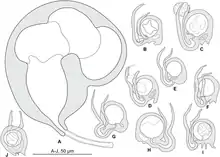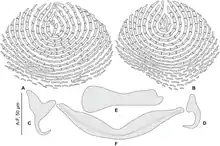Pseudorhabdosynochus enitsuji
Pseudorhabdosynochus enitsuji is a diplectanid monogenean parasitic on the gills of groupers. It has been described in 2007 by Lassad Neifar & Louis Euzet.[1] The name of the species honours French parasitologist Jean-Lou Justine (enitsuji is an anagram of Justine).[1] The species has been redescribed by Amira Chaabane, Lassad Neifar, and Jean-Lou Justine in 2017, from the type-material and additional specimens.[2]
| Pseudorhabdosynochus enitsuji | |
|---|---|
 | |
| Pseudorhabdosynochus enitsuji: male and female sclerotised organs | |
| Scientific classification | |
| Domain: | Eukaryota |
| Kingdom: | Animalia |
| Phylum: | Platyhelminthes |
| Class: | Monogenea |
| Order: | Dactylogyridea |
| Family: | Diplectanidae |
| Genus: | Pseudorhabdosynochus |
| Species: | P. enitsuji |
| Binomial name | |
| Pseudorhabdosynochus enitsuji Neifar & Euzet, 2007 | |
Description


Pseudorhabdosynochus enitsuji is a small monogenean. The species has the general characteristics of other species of Pseudorhabdosynochus, with a flat body and a posterior haptor, which is the organ by which the monogenean attaches itself to the gill of is host. The haptor bears two squamodiscs, one ventral and one dorsal.
The sclerotized male copulatory organ, or "quadriloculate organ", has the shape of a bean with four internal chambers, as in other species of Pseudorhabdosynochus. The vagina includes a sclerotized part, which is a complex structure.
Chaabane, Neifar, and Justine, in 2017 considered that the three species Pseudorhabdosynochus riouxi, Pseudorhabdosynochus bouaini, and Pseudorhabdosynochus enitsuji shared a common general structure of the sclerotized vagina with a conspicuous spherical secondary chamber and proposed to accommodate them within a ‘Pseudorhabdosynochus riouxi group’. These three species are also parasites on groupers classified within the genus Mycteroperca.[2]
Hosts and localities
The goldblotch grouper Mycteroperca costae is the type-host of Pseudorhabdosynochus enitsuji. The type-locality is the Mediterranean Sea off Tunisia; Off Libya and the Atlantic Ocean off Dakar, Senegal are additional localities.[1][2]
References
- Neifar, Lassad; Euzet, Louis (2007). "Five new species of Pseudorhabdosynochus (Monogenea: Diplectanidae) from the gills of Epinephelus costae (Teleostei: Serranidae)" (PDF). Folia Parasitologica. 54 (2): 117–128. doi:10.14411/fp.2007.017. ISSN 0015-5683. PMID 17886741.

- Chaabane, Amira; Neifar, Lassad; Justine, Jean-Lou (2017). "Diplectanids from Mycteroperca spp. (Epinephelidae) in the Mediterranean Sea: Redescriptions of six species from material collected off Tunisia and Libya, proposal for the "Pseudorhabdosynochus riouxi group", and a taxonomic key". PLOS ONE. 12 (2): e0171392. Bibcode:2017PLoSO..1271392C. doi:10.1371/journal.pone.0171392. ISSN 1932-6203. PMC 5289622. PMID 28152034.
